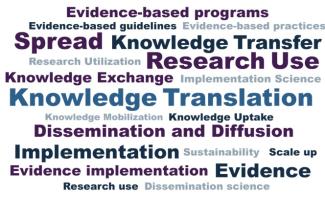What is knowledge exchange?
Knowledge exchange (Kx) is a process in which academic and non-academic partners collaborate on a research study through sharing of knowledge, expertise and resources to drive research impact.
Many terms are used in the process of moving research into action: knowledge translation, knowledge application, knowledge mobilization, implementation, research impact, etc.
We chose the term knowledge exchange because it describes the iterative process that brings together researchers and external partners to exchange ideas, evidence and expertise through the planning, production, sharing, and application of research to inform policies, practices, and public dialogue and drive positive change.
We broadly define Kx as research and related activities with social, political, environmental, economic, or cultural impacts. These impacts may occur through public dialogues, policymaking, professional practice or cultural spheres.

Why do knowledge exchange?
There is a substantial lag between discovery and adoption into policy or practice. This reality hampers the potential of scholarship to have a positive social impact and expand public conversation. We can link this hampered pathway from evidence to impact to a number of factors including a lack of engagement with knowledge users, misunderstandings about how to implement findings and uncertainty about how to target the appropriate audience for dissemination.
Through collaborations and partnerships with knowledge users, Kx can help embed your research findings in real world context, and spread and implement research evidence widely to inform effective practices, policies and programs. If knowledge users are involved and engaged in the research process, the results will be more relevant and useful to them, increasing the uptake and utilization of the research evidence.
What does knowledge exchange look like?
Knowledge exchange covers a wide spectrum of activities, and can occur at any and/or all stages of the research process. Examples of Kx activities include (but are not limited to):
Using research to drive positive change is a goal that the UBC academic community strives to achieve by exchanging ideas and knowledge beyond academia, establishing research collaborations with external partners, and engaging and communicating publicly.
Learn more about the innovative Kx activities happening at UBC:
